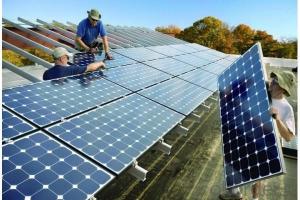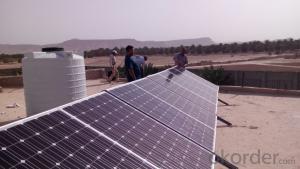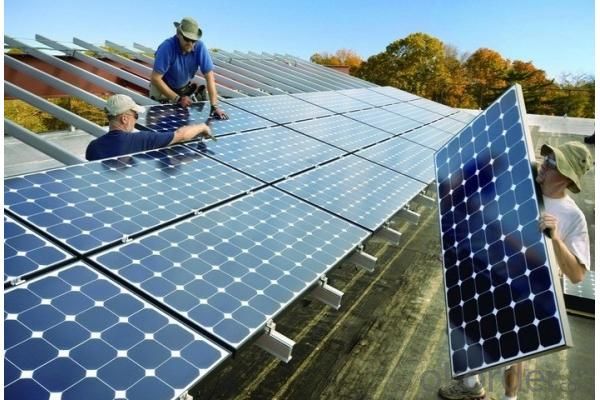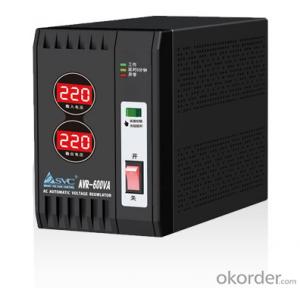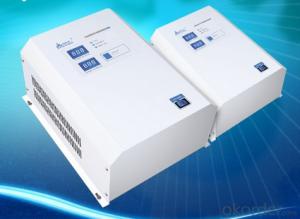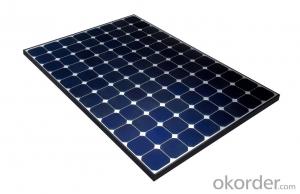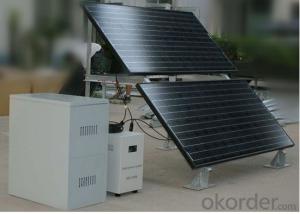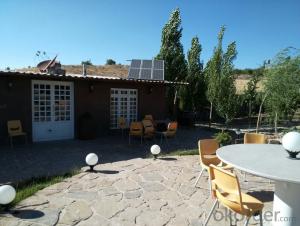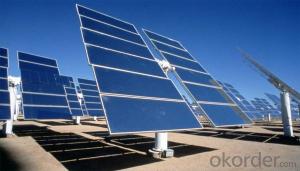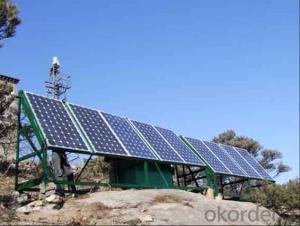Solar Energy Systems Orlando FL - Off-Grid Solar Power System 2KW High Efficiency
- Loading Port:
- China main port
- Payment Terms:
- TT OR LC
- Min Order Qty:
- 1 pc
- Supply Capability:
- 10000 pc/month
OKorder Service Pledge
OKorder Financial Service
You Might Also Like
1.Description of Product
Off-Grid Solar Power System is consisted of solar panel, solar charge controller, inverter, battery, mounting rack and cables.
(1).Grid-connected, send power to city grid
(2).MPPT technology, wide range of working voltage
(3).Simply Wiring, easy installation, customized design for your projects
(4).Low investment & long term feedback
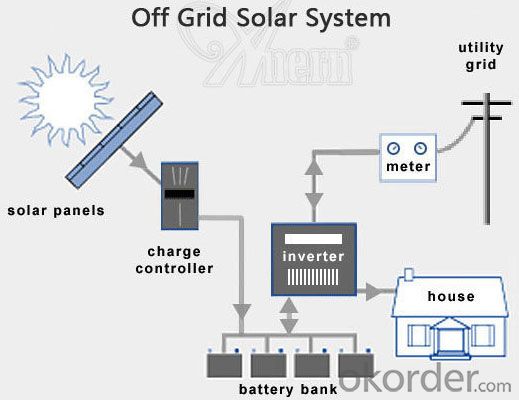
2. Off-Grid Features
1. Off grid solar power system is mainly used for application with relatively-small power consumption, and the areas have no grid network coverage, or grid power is unstable or outage condition.
2. It’s composed of solar panels, hybrid solar inverter, battery bank, solar panel mounting racks, and other accessories required fora complete home solar power system.
3. The battery bank gives a stable power output to the solar inverter which converts DC to AC to power loads, and provides power backup in rainy or cloudy days.
4. The solar panels generate electricity at daytime and charge the battery bank .
5. The off grid home solar power system provides grid power bypass in case of battery power shortage when sunshine is not enough.
6. All the off grid home solar power system configurations are worked out by scientific calculation and design.
The Product Parameter | |
Ref No. | 2KW |
Solar Panel | Type: Monocrystalline Silicon PV Module Max Power: 250W QTY:6 pcs |
Controller-Inverter Integrator | Rated Ouput Power: 2000W Rated DC Voltage: 48V QTY:1 pcs |
Battery | 12V/150AH per piece QTY:8 pcs |
Solar Panel Rack | Roof type mounting rack, anodized aluminum material, including complete fittings (Other type of racks can be customized as per client's requirement) QTY:1 pcs |
Cables | International standard, with specification suitable for solar system, RVV2*6 (20m), BV1*10 (20m) |
3.The Pictures of Product
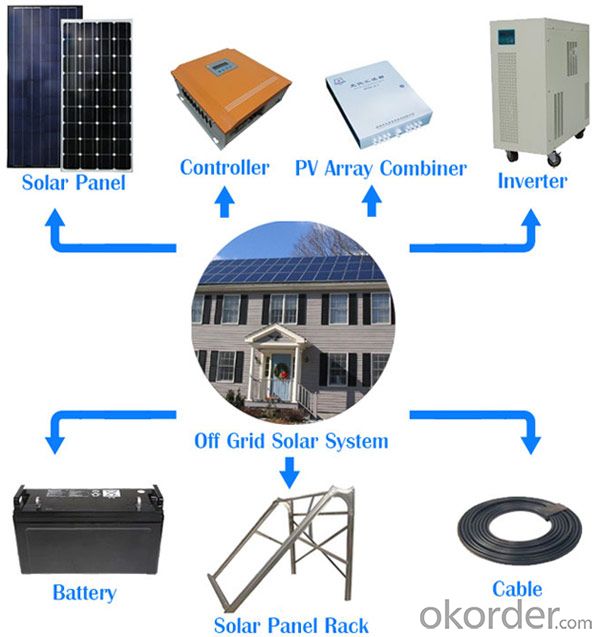
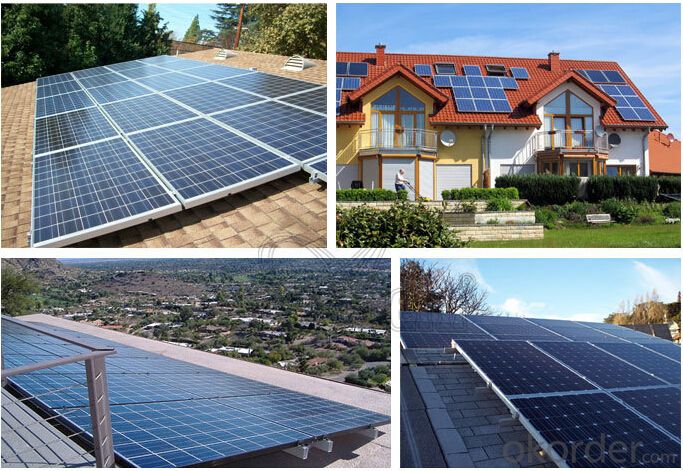
4.FAQ
Q1: What is the business type for the company?
A1: We are one of the biggest manufacturers inBejing.Chnia. Which is a high tech PV enterprise dedicated to the research, development, production and sales..
Q2: How long solar panel warranty can you offer?
A2: 10-Year product warranty,25-year linear power output warranty
If there is any quality problem, we will pay for freight and send free parts to you.
Q3: How many certificates do you have?
A3: We have 16 certificates,such as CE, TUV, UL, and so on.
Q4: Can I be the agent for you?
A4: Yes,We can discuss some information.
Q5: How to get a sample?How can cooperation with us
A5: contact us now.
- Q: Can solar energy systems be installed on rooftops?
- Yes, solar energy systems can be installed on rooftops. Rooftops are ideal locations for solar panel installations as they provide an unobstructed area with direct access to sunlight. This allows for maximum energy generation and utilization of available space, making rooftop installations a popular choice for residential, commercial, and industrial buildings.
- Q: Can solar energy systems be installed in areas with high winds?
- Yes, solar energy systems can be installed in areas with high winds. In fact, it is important to consider wind speeds when installing solar panels to ensure their structural integrity and longevity. Solar panels are designed to withstand various weather conditions, including high winds. Proper installation techniques, such as utilizing strong mounting systems and securing panels with appropriate fasteners, can enhance their resistance to wind damage. Additionally, some solar panel manufacturers conduct rigorous testing to ensure their products can withstand high wind speeds. It is recommended to consult with a professional installer who can assess the specific conditions of the area and design a solar energy system that can effectively withstand high winds.
- Q: Can solar energy systems be used for emergency response operations?
- Yes, solar energy systems can be used for emergency response operations. Solar power can provide a reliable source of electricity during emergencies, ensuring critical operations such as communication, lighting, medical equipment, and water pumping are sustained. These systems are portable, easy to deploy, and do not rely on an external power grid, making them suitable for remote or disaster-stricken areas. Additionally, solar energy is a clean and renewable resource, reducing reliance on fossil fuels and minimizing environmental impact during emergency operations.
- Q: How does the angle of incidence affect the performance of solar panels?
- The angle of incidence significantly affects the performance of solar panels. When the angle of incidence is perpendicular to the sun's rays (90 degrees), the panels receive the maximum amount of solar energy, resulting in the highest efficiency. As the angle deviates from perpendicular, the amount of energy captured decreases, leading to reduced performance. Therefore, adjusting the angle of solar panels to match the sun's position throughout the day optimizes their efficiency and overall performance.
- Q: Can solar energy systems be used in powering recreational facilities like gyms or spas?
- Yes, solar energy systems can definitely be used to power recreational facilities like gyms or spas. Solar panels can be installed on the roofs or grounds of these facilities to convert sunlight into electricity. This renewable energy source can provide a significant portion, if not all, of the power needed to operate the facilities. Additionally, solar energy systems can help reduce the carbon footprint of these establishments and contribute to a more sustainable and environmentally friendly operation.
- Q: Do solar energy systems work at night?
- At night, solar energy systems are unable to function due to their reliance on sunlight for the generation of electricity. Through the photovoltaic effect, solar panels transform sunlight into electricity by dislodging electrons from atoms with photons from the sun's rays, thus establishing an electric current. The absence of sunlight results in the absence of an energy source to sustain the system. Nevertheless, it is important to note that certain solar energy systems possess the capability to store surplus energy generated during the day in batteries, enabling the utilization of this stored energy for operating appliances or lighting during the night.
- Q: What is the role of microinverters in a solar energy system?
- Microinverters play a crucial role in a solar energy system as they convert the direct current (DC) produced by individual solar panels into alternating current (AC) that can be used to power homes and businesses. Unlike traditional string inverters, microinverters are installed on each panel, allowing for better energy production and system performance, even in shaded or partially shaded areas. Additionally, microinverters enable real-time monitoring of each panel's performance, simplifying maintenance and troubleshooting processes.
- Q: Can solar energy systems be used in areas with frequent hurricanes?
- Yes, solar energy systems can be used in areas with frequent hurricanes. While it is true that hurricanes can cause damage to solar panels and other components of solar energy systems, there are measures that can be taken to mitigate these risks. Firstly, the design and installation of solar energy systems in hurricane-prone areas can be done to withstand high winds. This includes using stronger mounting systems, reinforced frames, and secure anchoring techniques. Additionally, the orientation and tilt angle of the panels can be optimized to minimize wind resistance. Furthermore, regular maintenance and inspections can help identify any potential issues or damage to the system before a hurricane hits. This allows for timely repairs or replacements, ensuring the system remains functional and safe during extreme weather events. In the event of a hurricane, it is important to have emergency procedures in place to secure the solar panels and other components. This can involve temporarily removing the panels and securing them indoors or utilizing protective covers to shield them from debris. Moreover, the use of microinverters or power optimizers in solar energy systems can enhance their resilience in hurricane-prone areas. These technologies allow each solar panel to operate independently, mitigating the impact of any damage to a single panel and preventing the entire system from shutting down. Lastly, solar energy systems can also contribute to the resilience of communities during and after hurricanes. With proper battery storage, solar systems can provide backup power during power outages, allowing essential services to continue operating and providing electricity for critical needs such as lighting, refrigeration, and medical equipment. Overall, while precautions need to be taken to ensure the durability and functionality of solar energy systems in hurricane-prone areas, they can be effectively used to harness clean and renewable energy even in the face of frequent hurricanes.
- Q: Can solar energy systems be used in areas with high pollution?
- Solar energy systems can indeed be utilized in areas with high pollution. In actuality, solar power presents a feasible solution to combat pollution in such areas. Although pollution may somewhat decrease the efficiency of solar panels, it does not render them completely ineffective. Solar energy systems can still generate electricity even amidst polluted environments. Additionally, implementing solar energy systems in areas with high pollution can yield various benefits. Firstly, it provides a clean and renewable energy source, reducing reliance on fossil fuels and diminishing greenhouse gas emissions. This assists in mitigating the pollution problem and enhancing air quality. Furthermore, solar power can be decentralized, allowing for local generation within polluted areas. This reduces the need for long-distance electricity transmission, which can further contribute to pollution. By generating energy on-site, solar systems help alleviate strain on the existing power grid and enhance overall energy system efficiency. Moreover, installing solar energy systems in polluted areas can raise awareness and promote a transition towards clean energy practices. It serves as a visible demonstration of renewable energy's potential, inspiring individuals and communities to adopt more sustainable practices and reduce pollution. While pollution does impact solar panel efficiency, advancements in technology and innovative designs can mitigate these effects. For instance, the utilization of anti-reflective coatings and regular cleaning of solar panels can enhance their performance in polluted environments. In conclusion, solar energy systems can certainly be utilized in areas with high pollution. They offer a clean and renewable energy source, aid in pollution reduction, and inspire a shift towards sustainable practices. Despite pollution's impact on efficiency, ongoing technological advancements make solar power a viable option even in polluted areas.
- Q: How much energy can a solar energy system produce?
- The amount of energy that can be generated by a solar energy system relies on a variety of factors, including the system's size, efficiency, location, weather conditions, and available sunlight. On average, a typical solar energy system can produce between 1 and 10 kilowatt-hours (kWh) of electricity per day for every installed kilowatt (kW) of solar panels. To illustrate, a solar energy system with a capacity of 5 kW can generate approximately 5 to 50 kWh of electricity daily, which is typically sufficient to fulfill the energy needs of an average household. However, it is important to note that this energy production can fluctuate throughout the year due to seasonal changes in sunlight availability and weather conditions. Furthermore, advancements in solar technology and enhanced efficiency of solar panels have resulted in significant improvements in energy production. By utilizing high-performance solar panels and optimized system designs, it is possible to generate even greater amounts of electricity, thereby maximizing the energy output of a solar energy system. Moreover, any surplus energy generated by a solar energy system can be stored in batteries for future use or fed back into the power grid, depending on the specific setup and local regulations. This enables further utilization and optimization of solar energy production. Ultimately, the potential energy production of a solar energy system is a dynamic and customizable aspect that can be adjusted to meet individual energy requirements and objectives. Seeking guidance from a solar energy professional can provide more precise estimates and assist in designing a system that is best suited to specific needs.
Send your message to us
Solar Energy Systems Orlando FL - Off-Grid Solar Power System 2KW High Efficiency
- Loading Port:
- China main port
- Payment Terms:
- TT OR LC
- Min Order Qty:
- 1 pc
- Supply Capability:
- 10000 pc/month
OKorder Service Pledge
OKorder Financial Service
Similar products
Hot products
Hot Searches
Related keywords
